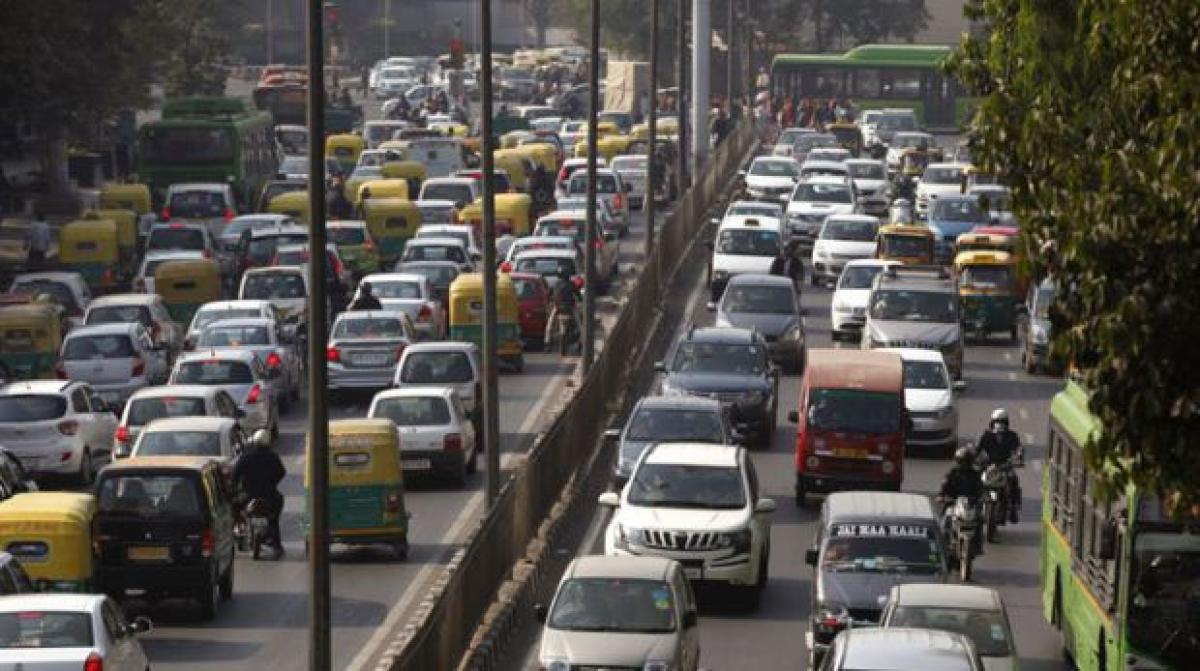Live
- Starc, Hazlewood, Cummins added to BBL 14 supplementary lists
- Flood risk in low-lying areas of Chennai as Chembarambakkam Lake’s water level rises
- Pushpa 2 Theatre Canteen Owner Bites Customer’s Ear in Gwalior
- RG Kar tragedy: Statement of forensic doctor who took pictures of victim’s body crucial for CBI
- Include Valmiki community in ST list, MP Ambica pleads
- Nara Lokesh Urges Rapid Investment Approvals to Boost Employment in MSME Sector
- Chandrababu Advocates Strict Measures for Social Welfare and Infrastructure Development in AP
- Show of brotherhood by Vijayan, Stalin at event to honour Dravidian icon
- District Collectors’ conference with CM begins
- Celebrations kick off in Saudi Arabia to welcome FIFA World Cup 2034
Just In

x
Highlights
Delhi High Court on Wednesday asked the Aam Aadmi Party government to explain whether it is not enough to continue their odd-even vehicles scheme, slated for a fortnight till January 15, for one week.
Delhi High Court on Wednesday asked the Aam Aadmi Party government to explain whether it is not enough to continue their odd-even vehicles scheme, slated for a fortnight till January 15, for one week.

A bench of Chief Justice G Rohini and Justice Jayant Nath also said the Delhi government will have to admit that they do not have sufficient public transport to ferry people which was causing inconvenience to a large section of society.
"Aren't these six days enough for you? We have permitted the government to run this scheme for one week during which they must have collected data relating to pollution levels in the city," it said.
The court, however, fixed the matter for January 8 by when it has asked the government to get instructions on whether its pilot project can be reduced to a week instead of 15 days.
It also asked the government to provide data related to changes in the pollution level between January 1 and 7.
"In these six days you must have collected data related to pollution level, we think it's sufficient for you. You will have to think about inconvenience cause to public at large," the bench said, adding, "there is a practical difficulty."
It also said that the court does not interfere with the policies but government must think about it as people are knocking its door complaining of inconvenience being caused.
"You (government) have to think about it. Your status report is vague and does not reveal much," the bench said, adding, "There is no sufficient public transport. Is it really necessary to have it for 15 days?"
The court also wished to know from the government how many cabs are plying on diesel and CNG in the capital and what level of pollution were they emitting.
The court's direction came on a batch of petitions filed by various individuals including lawyers who have challenged AAP goverment's December 28, 2015 notification bringing into force the scheme which allows private cars with odd-numbered plates to ply on odd-numbered dates and vice-versa.
While seeking quashing of the notification, a plea filed by Delhi High Court Bar Association President Rajiv Khosla sought explanation from Delhi government on what jurisdiction it has to fix a fine of Rs 2,000 without amendment in the Motor Vehicles Act.
Opposing the move from various sections of the society, senior standing counsel Rahul Mehra, appearing for Delhi government, said "the scheme is only for 15 days and the State is equally pained by the inconvenience being caused to public."
The Government on Tuesday had said that a data of pollutants collected from over 55 locations showed a clear trend of improving air quality in several areas across the city and that there has been a "positive impact" of the odd-even scheme.
"According to the scientists of the Delhi Pollution Control Committee (DPCC), 80 per cent of PM2.5 air pollution is caused by vehicular traffic and reduction in its levels, even in outer areas of Delhi shows that reduction of four wheeled vehicles on roads since the New Year Day is having a positive impact," the government had said in a statement.
However, a report by IIT Kanpur had said vehicular pollutions contribute to around 25 per cent of PM2.5 concentrations during winters which comes down to 9 per cent during summers.
It said the ambient air data collected by DPCC through mobile dust samplers using Light Scattering Technique at 20 locations in peripheral areas of Delhi on January 4 showed a clear declining trend in the levels of PM2.5.
The major source of PM2.5 pollutant is vehicular pollution.
"In 13 of these 20 locations, the PM2.5 level has been recorded at less than 300, which proves reduction in comparison to previous years at the same time by at least 100 units," it said.
Transport Minister Gopal Rai had asked for data collection from peripheral areas of Delhi to ascertain the impact of NCR towns on air pollution of Delhi. Rai said that the odd-even scheme was being smoothly implemeted.
Government said since January 1, the DPCC mobile teams have recorded ambient air data from 55 locations, and the trend is that air quality is improving in central parts and other areas which are not on the borders of the national capital.

Next Story
More Stories
ADVERTISEMENT
© 2024 Hyderabad Media House Limited/The Hans India. All rights reserved. Powered by hocalwire.com







